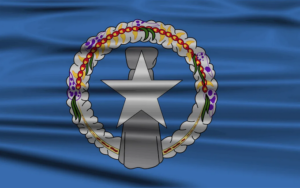By Mark Rabago, RNZ Pacific Commonwealth of the Northern Marianas correspondent
A man on Saipan has burned the official CNMI flag in protest, saying that it does not truly represent Indigenous people of the Commonwealth of the Northern Marianas (CNMI).
A public video of the flag-burning was posted by Raymond Quitugua that has stirred various negative reactions within the CNMI community.
Under the CNMI’s constitution, flag-burning is prohibited and those found to have breached the law can face up to one year in jail or fined up to US$500 (NZ$835).

Quitugua said the true CNMI flag was the initial design presented back in the 1970s that featured a latte stone with a star in the front of it on a field of blue.
The current official flag of the US territory consists of a rectangular field of blue, a white star in the center, superimposed on a gray latte stone, surrounded by the traditional Carolinian mwáár.
But Quitugua claims the official flag does not accurately represent the Indigenous people of the CNMI, which he believes is the Chamorro community (not including the Carolinian community).
He added that he burned the flag as a form of protest and he intended to take the issue to court.
Disappointed, insulted
Renowned elder in the CNMI community, Lino Olopai, as well as one of the many champions of the CNMI’s flag, expressed disappointment and insulted by Quitugua’s actions and said that warranted jail time.
Olopai said the basis of the current CNMI flag was indeed the Chamorro flag, but a group of Carolinians that included himself fought to have a mwáár on the flag as a representation of the Carolinian community as they believed they, too, were indigenous people of the CNMI.
He added that Quitugua’s flag-burning is a form of discrimination against the Carolinian community, which like the Chamorros, are the two recognised Indigenous people of the CNMI.
“Stop the racism. We are all part of the Pacific islands,” Olopai said.
“We should maintain peaceful attitude and spirit with one another. Not just between the Chamorro and Carolinian communities, but with other communities across the Pacific,” he said.
In a letter to the editor of the Saipan Tribune, former lawmaker Luis John Castro also criticised Quitugua’s flag-burning, saying there were other more constructive forms of protest.
“If something such as the flag does not jive with your beliefs, OK you don’t have to agree,” he said, adding “but there are many ways to resolve differences other than desecrating a cultural symbol”.
“Conduct an online poll, call into [a radio station] and make it a topic of discussion. Hold a town hall meeting with other concerned citizens, ask a legislator to draft bills or initiative to address its look, or file a certified question with the courts to get an answer to your concerns.
“Why do something like burn the flag? To seek attention? To get likes and shares on Facebook? To incite civil unrest?” he wrote.
This article is republished under a community partnership agreement with RNZ.
Article by AsiaPacificReport.nz





